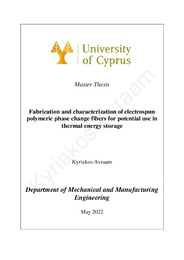| dc.contributor.advisor | Krasia-Christoforou, Theodora | en |
| dc.contributor.author | Avraam, Kyriakos | en |
| dc.coverage.spatial | Cyprus | en |
| dc.creator | Avraam, Kyriakos | en |
| dc.date.accessioned | 2022-06-06T04:44:51Z | |
| dc.date.available | 2022-06-06T04:44:51Z | |
| dc.date.issued | 2022-05 | |
| dc.identifier.uri | http://gnosis.library.ucy.ac.cy/handle/7/65256 | en |
| dc.description.abstract | The need for energy is constantly growing, making it necessary to effectively implement systems to meet the needs of the world's growing population while avoiding energy crises. As the levels of greenhouse gases in the environment continue to rise at an alarming rate, it is critical to develop non-fossil fuelbased energy sources. Renewable Energy, provides clean energy alternatives, however the intermittency of renewable energy sources, is a key barrier in terms of round-the-clock energy production from them. This can be managed by incorporating thermal energy storage (TES) into more efficient and cleaner energy systems, so improving the reliability of thermal energy from renewable sources. TES employing heat transfer medium such as phase change materials (PCMs), has steadily become an important study subject in recent decades.
Form stable Phase Change Fibers (PCFs) have been introduced for their unique advantages such as direct use without encapsulation, cost-effective and flexible dimensions and excellent thermal performances. They are used for thermal energy storage because they can store energy at different levels of temperature by latent heat storage.
In the present study, ultrafine PEO/ PMMA/ n-eicosane composite nano/microfibers as form-stable phase change materials were successfully developed by the uniaxial electrospinning technique. N-eicosane, a hydrocarbon with melting point near the human body temperature and high latent heat was chosen as the PCM. Systematic parametric studies were carried out in order to determine the optimum experimental conditions for obtaining fibrous membranes. Electrospun PEO/ PMMA (80/ 20) and PEO/ PMMA (50/ 50) beaded and bead-free fibers were employed as matrices for the incorporation of n-eicosane.
The effect of n-eicosane content on the morphology and thermal properties of the form-stable PEO/ PMMA/ n-eicosane phase change fibers was scientifically investigated by using scanning electron microscopy (SEM) and differential scanning calorimeter (DSC). The membrane seems to be very stable, and the fibers remain intact in the form of PCFs without observing any n-eicosane leaching phenomena or material alteration. In general, the enthalpies of the systems were high and comparable to the ones reported for other phase change materials based on n-eicosane or other paraffins. | en |
| dc.language.iso | eng | en |
| dc.publisher | Πανεπιστήμιο Κύπρου, Πολυτεχνική Σχολή / University of Cyprus, Faculty of Engineering | |
| dc.rights | info:eu-repo/semantics/openAccess | en |
| dc.rights | Open Access | en |
| dc.title | Fabrication and characterization of electrospun polymeric phase change fibers for potential use in thermal energy storage | en |
| dc.type | info:eu-repo/semantics/masterThesis | en |
| dc.contributor.committeemember | Rebholz, Claus | en |
| dc.contributor.committeemember | Grigoriadis, Dimokratis | en |
| dc.contributor.department | Τμήμα Μηχανικών Μηχανολογίας και Κατασκευαστικής / Department of Mechanical and Manufacturing Engineering | |
| dc.subject.uncontrolledterm | PHASE CHANGE MATERIALS | en |
| dc.subject.uncontrolledterm | PHASE CHANGE FIBERS | en |
| dc.subject.uncontrolledterm | ELECTROSPINNING | en |
| dc.subject.uncontrolledterm | THERMAL ENERGY STORAGE | en |
| dc.subject.uncontrolledterm | N-EICOSANE | en |
| dc.subject.uncontrolledterm | SCANNING ELECTRON MICROSCOPY | en |
| dc.subject.uncontrolledterm | DIFFERENTIAL SCANNING CALORIMETER | en |
| dc.author.faculty | Πολυτεχνική Σχολή / Faculty of Engineering | |
| dc.author.department | Τμήμα Μηχανικών Μηχανολογίας και Κατασκευαστικής / Department of Mechanical and Manufacturing Engineering | |
| dc.type.uhtype | Master Thesis | en |
| dc.contributor.orcid | Krasia-Christoforou, Theodora [0000-0002-9915-491X] | |
| dc.gnosis.orcid | 0000-0002-9915-491X | |

